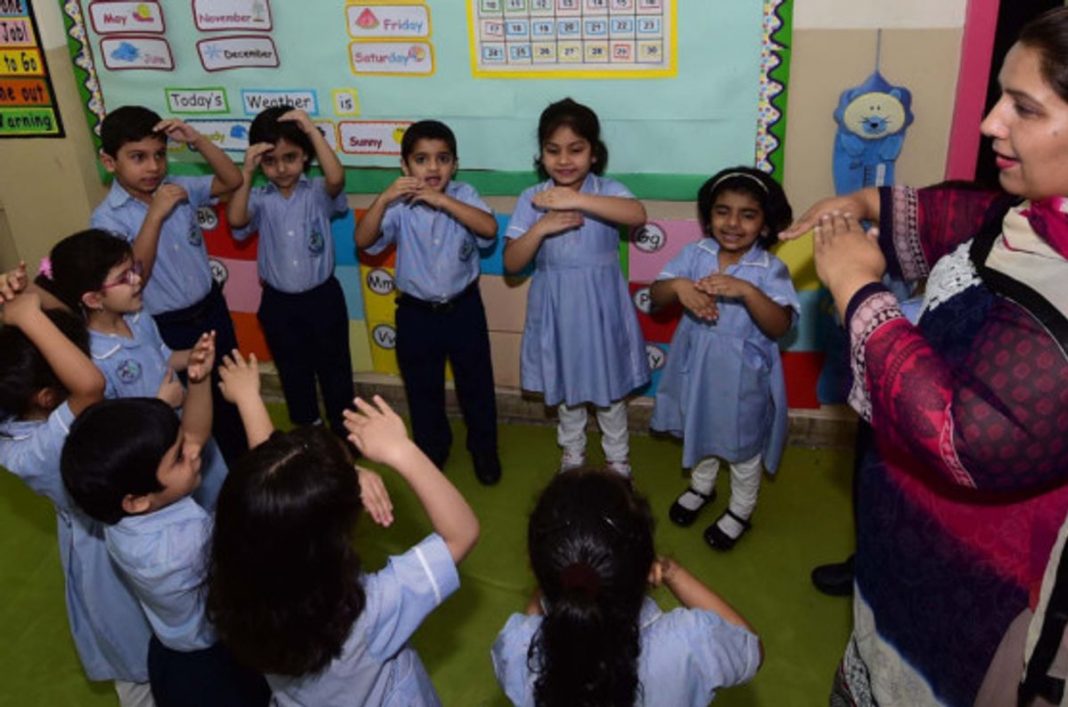Federal Minister for Education and Professional Training Shafqat Mahmood on Monday steered a meeting that was convened to decide whether to reopen schools and universities across Pakistan from September 15 onwards. The meeting was attended by Pakistan’s provincial education ministers, the Head of the Higher Education Commission’s (HEC), Special Assistant to the Prime Minister on Health Dr Faisal Sultan, and others.
The officials also took part in the Inter-Provincial Education Ministers Conference (IPEMC). The recommendations from members of the IPMEC to resume educational activities would be conveyed to the National Command Operation Centre (NCOC) for further deliberations among all the stakeholders before a final decision is made.
Finalizing the standard operating procedures (SOPs) for schools was also a part of the meeting agenda. Educational institutes across Pakistan had been shut down back on March 13 in a bid to curb the spread of the deadly coronavirus. The Single National Curriculum (SNC), examinations for the next year, and establishment of anti-harassment bodies were also discussed by the education officials.
Read More: Pakistan’s Educational Assistance to Afghans
Happening Now:
Federal Minister @Shafqat_Mahmood presides Inter provincial Education Ministerial to discuss #ReopeningOfSchools, Dr Faisal Sultan,SAPM on health is present in the meeting @fslsltn
Provincial ministers for education & HEC are attending the meeting #Pakistan pic.twitter.com/f0OKSHdJNx— Ministry of Education and Professional Training (@EduMinistryPK) September 7, 2020
Provinces decided to reopen schools
Saeed Ghani, Sindh Education Minister, told the media that all educational institutes were to reopen between September 15 and 30.
“All classes starting Grade 9 and up, as well as all universities, would reopen from Sept 15, while Grade 6-8 classes would resume by Sept 22,” Ghani said, adding, however, “that pre-primary and primary classes would reopen on Sept 30”.
Schools that may suffer from a coronavirus surge would be sealed off and locked down. “Wearing face masks would be mandatory in the schools and strict action was to be taken in case of violation of the coronavirus-related SOPs,” he added.
Read more: Pakistan: Is it safe to reopen schools now?
Furthermore, Dr Murad Raas, Minister of Education in Punjab, said there would be no double shift. “Alternative day schedule to be followed by all public & private schools,” Raas said on Twitter.
ANNOUNCEMENT:
All Public & Private Schools of Punjab to open on following schedule. Classes 9-12 to start on 15th. Classes 6-8 to start Sept 22nd. Classes Nursury-5 to start on 30th. No Double Shift. Alternative Day Schedule to be followed by all Public & Private Schools.— Murad Raas (@MuradRaasMR) September 7, 2020
The provincial education department in Khyber Pakhtunkhwa has decided to conduct coronary tests on school staff and students.
“Health Department’s teams will be visiting public and private educational institutions to conduct random tests of teachers / staff / students / canteen vendors and all those persons who are working within the premises of educational institutions in an effort to detect COVID-19 positive cases and prevent the spread of disease,” a notification shared on the Twitter account of the ruling PTI’s KP chapter stated.
پشاور:محکمہ تعلیم خیبر پختونخوا نے اسکول عملے اور طلبا کا کرونا ٹیسٹ کرانے کا فیصلہ کیا ہے
تفصیلات کے مطابق محکمہ تعلیم کے پی نے اسکول عملے اور طلبا کا رینڈم کرونا ٹیسٹ کرانےکا فیصلہ کر لیا۔محکمہ تعلیم خیبرپختونخوا نے تمام اسکولوں کے سربراہان کو فیصلے سے آگاہ کر دیا#KPKUpdates pic.twitter.com/WhlVldhKlZ
— PTI Khyber Pakhtunkhwa (@PTIKPOfficial) September 7, 2020
Universities and schools reopening on a rotational basis
On August 27, the NCOC had suggested that all educational institutes in the country be reopened in a descending order with higher education taking priority — universities first, then colleges, schools, and so on — and opening is to be conducted on a rotational basis.
To reach a final consensus on the reopening of educational institutes from university to school levels, both private and public representatives of educational institutes from all over were invited, as well as those from madrassas.
The NCOC gave a statement after the meeting, which recommended that all co-curricular activities and activities involving mass gatherings be refrained, effective immediately, to reduce school timings and promote a safer environment.
GVS News Desk














